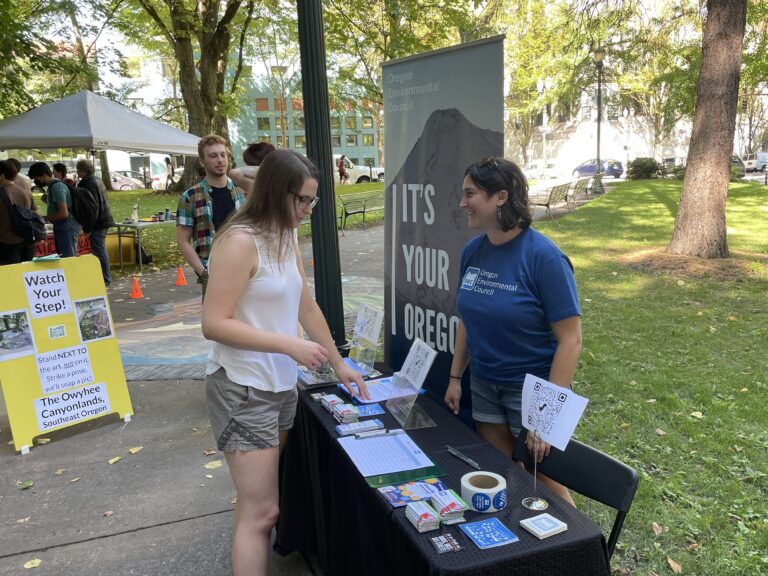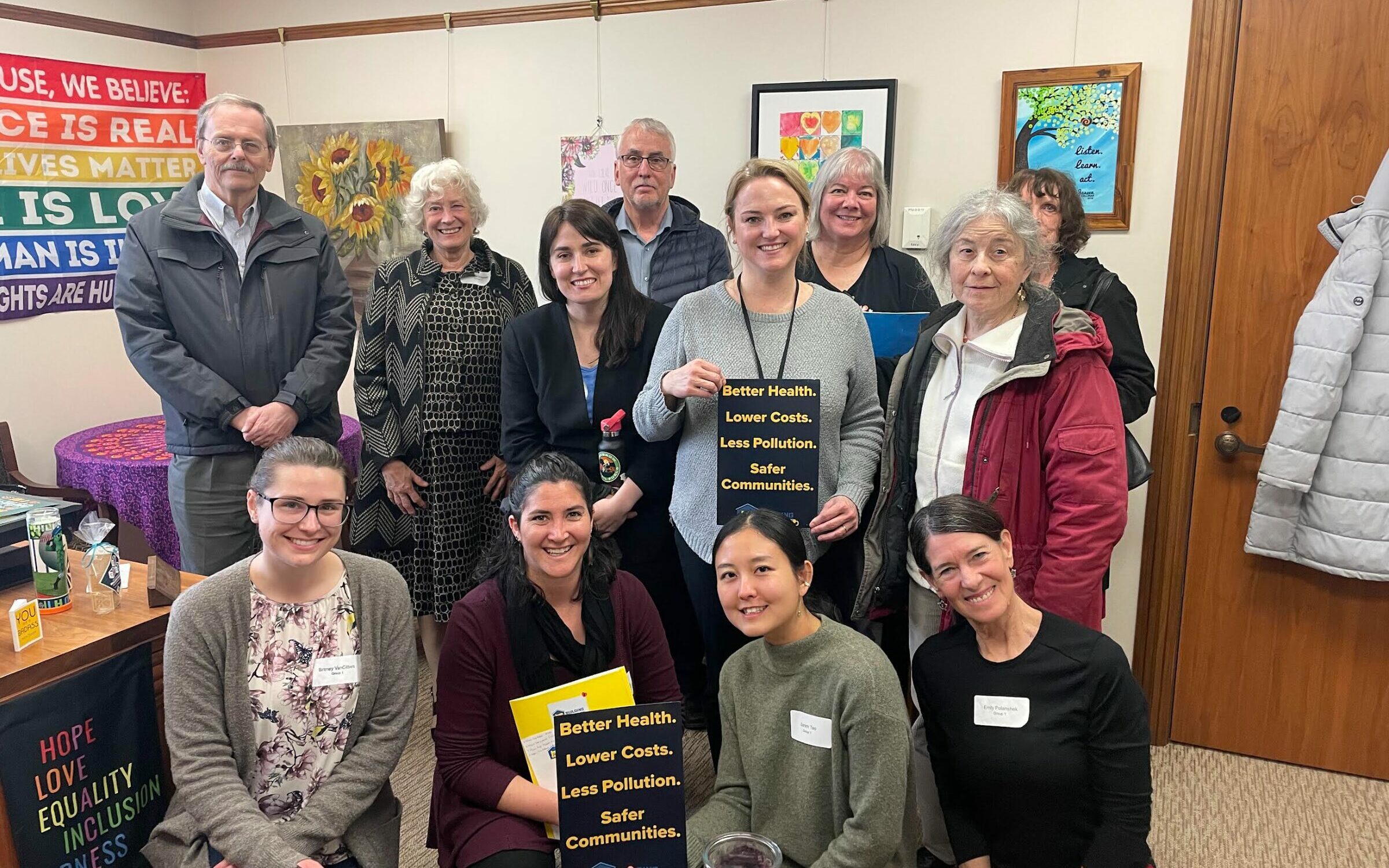
Over the past year, the Oregon State Legislature has enacted several key sustainability-focused bills, establishing a significant role as an environmental advocacy and climate resiliency leader. The 2023 legislative session saw the signing of 28 environmental bills into law, including the Climate Resilience Package. This package will support local job creation as well as improve energy efficiency, increase access to renewable energy sources, and protect the state’s natural resources through healthier crops, improved water quality, and increased drought and wildfire resistance.
The passage of all this legislation was helped in no small part by the Oregon Environmental Council (OEC), a nonprofit and nonpartisan organization that advances solutions to Oregon’s environmental challenges. Jacqui Treiger is campaign manager for climate and transportation at OEC, working to further initiatives that reduce climate pollution, increase community resilience, and build a transportation system that works for everyone.
AP: Could you elaborate on the initiatives and activities that the Oregon Environmental Council has been engaged in across Oregon recently?
Treiger: Since our founding in 1968, OEC has been a part of passing landmark environmental legislation in Oregon. From securing the status of Oregon's beaches as public goods to spearheading the Bottle Bill and pioneering bottle recycling in the state, the OEC relentlessly advocates for impactful and enduring solutions. These initiatives target the root causes of Oregon's environmental issues, yielding tangible benefits for public health and overall quality of life. Our goals are a stable climate that safeguards our communities and economy; clean and plentiful water that supports local residents and wildlife; and healthy neighborhoods free of air pollution. This past legislative session, OEC worked to pass a number of bills that will protect youth from toxic chemicals, phase out “forever chemicals,” protect frontline workers from climate-fueled extreme weather, and set Oregon up to leverage federal funding for water, climate, and transportation infrastructure. OEC not only works to pass legislation, but we follow through and ensure the implementation and agency rulemaking is strong.
AP: With the evolving landscape of environmental policy, is there a growing demand for experts in STEM within your organization?
Treiger: Absolutely, expertise in STEM fields is a distinctive niche in our work. Individuals with a background in these areas bring invaluable authority and insight, especially when it comes to engaging with legislators and key decision-makers. Their knowledge not only enriches our campaign strategies but also enhances our credibility and effectiveness when we present complex scientific data and advocate for policy changes.
AP: What kind of work do volunteers with STEM backgrounds engage in?
Treiger: At OEC, we pride ourselves in identifying and advancing science-based policy solutions to Oregon’s pressing environmental challenges. Individuals with STEM backgrounds have an important role to play in lending their expertise to inform the development of policy. For instance, when OEC and partners were working to develop protections for frontline workers from wildfire smoke and extreme heat, we worked closely with health and science experts to understand the health impacts of these climate hazards and how best to mitigate them. We also rely on scientific consensus to identify goals for state greenhouse gas emissions reductions. Volunteers with STEM backgrounds have a powerful voice and perspective to contribute to the policymaking process in Oregon. Many of our volunteers possess this expertise, which has been a significant asset to our cause.
We are often up against well-funded companies that don’t always want to change how they do business. Whether it's addressing tailpipe pollution from car exhaust or toxic chemicals used in consumer products, using your STEM expertise can lend credence to the need for policy action. And your voice can be decisive in persuading legislators to act.

AP: What are the benefits of civic engagement?
Treiger: Elected officials are in office to serve their communities and want your input along the way. They’re there to represent us, so it's our job to make sure they know what we find important and that they prioritize it. Whether you are sending emails, making phone calls, submitting written testimony, verbally testifying at a hearing, or participating in a lobby day and meeting with your legislators and their staff, hearing from you makes a big impact!
This past legislative session, Senate Republicans led the longest walkout in state history, effectively stalling legislative action on hundreds of bills. When the walkout ended, there was very little time remaining before the constitutional end of session. We worked to make sure that OEC members and constituents across the state were kept informed about legislative developments and key opportunities for climate action. Thanks to a consistent drumbeat of support from Oregonians across the state, lawmakers committed to prioritizing climate action and voted to pass the Climate Resilience Package in the final remaining days of session. This sweeping climate package could enable Oregon to leverage more than $1 billion in federal funding in climate and clean energy to create and sustain local jobs in construction, energy, and agriculture, expand access to renewable energy sources, and support the state’s natural resource economies. It could not have happened without robust, sustained civic engagement, especially through the six-week walkout, from volunteers calling, emailing, submitting comments and attending lobby days in support of climate action.
These opportunities occur during the legislative sessions, but also at the local level, with your city and county officials. After a bill is signed into law, there is often a next step called “rulemaking,” where government agencies fill in the details to determine how the law will actually work. Throughout the rulemaking there are opportunities for the public to weigh in. These don’t get as much attention, so your voice can have a big impact. Rulemakings are where environmental laws are either given the strength they need to protect our future, or completely gutted. That’s why it is vital that community members pay attention, show up, and make your voice heard.
AP: How did you get involved with OEC?
Treiger: I studied environmental science and public health in college, and while I love science, I found I really enjoyed translating what I knew to people less engaged in the “wonkiness” of it all. I really enjoy connecting with people. I found that civic engagement helped to combat my climate anxiety and that taking action and being part of a broader community is really empowering.
AP: What are you doing now with the organization?
Treiger: For the 2023 legislative session, OEC and a number of partner organizations created a coalition to work on efficient and resilient buildings. Buildings are the second largest source of climate pollution in Oregon and our first line of defense against climate harm. The Building Resilience Coalition came together to advance a package of bills that provide incentives and tools for Oregon to rapidly reduce the use of fossil fuels in new and existing buildings while ensuring that buildings are affordable and healthy for all Oregonians. I co-managed the broader coalition of over 50 organizations working to support this legislation, which passed as part of the Climate Resilience Package. Now we are focused on the implementation of these bills and looking at what are the next steps in continuing to create a resilient, efficient, and electric building sector.
I also work on transportation policy. Transportation is the largest climate pollution-emitting sector in Oregon. Both the 2024 and 2025 legislative sessions are gearing up to have a large focus on transportation. Every few years there is a transportation package, the last one was passed in 2017, and 2025 is expected to see the next one. OEC is working with many organizations and agencies in the hopes of creating the greenest transportation package in the nation that cuts climate pollution by reducing the miles people drive in their cars and electrifying the rest.
AP: What are the future priorities for OEC, and for Oregon in general?
Treiger: On top of gearing up for the upcoming legislative sessions, we are focused on strong implementation of the policy progress we have been proud to help deliver. This includes climate emissions reductions and resiliency, creation of jobs in the clean energy economy, and ensuring workers are protected as the climate changes and we face more extreme weather and wildfires. We are eager to work with Governor Kotek’s administration and legislators to build on the progress we’ve made and accelerate emission reductions with the best available science. Working at the same time to protect people from climate impacts and co-pollutants associated with greenhouse gas emissions. We are continuing to find new tools and ways to engage with communities and to grow our partnerships across the state including with folks in STEM. Oregon’s science community is at the forefront of research and analysis when it comes to environmental challenges Oregon faces today. Every day there are new studies and articles published that help demonstrate the need for urgent and lasting policy solutions.
OEC is also focused on assessing water quality and quantity - ensuring communities and natural resource economies have sustainable water supplies moving forward. As well as advocating for legislation that protects public health and the strong implementation of these laws, such as the Toxic Free Kids Act and the Toxic Free Cosmetics Act, which are aimed at eliminating harmful toxins from these products. To learn more, you can sign up for OEC’s email list or check out our website- oeconline.org.
Since the Toxic Free Kids Modernization Act was first passed in 2016, more than 4,000 reports showed the presence of arsenic, lead, formaldehyde and other toxins in children’s products. According to the OEC, “Engaging in genuine negotiations, building strong relationships, and being credible advocates for science-based protections led to…environmental wins.”
Are you involved with an organization or effort that you think might be of interest to the ESAL community? Or have heard about an organization or initiative that you’d like to learn more about? Let us know here, and we may feature it in a future post.